The Town
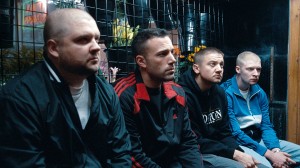 When an actor with aspirations to become a director is on the set of a movie he regrets signing up for, does he use it as an excuse to learn what not to do? If it’s a film he does believe in, does he take mental notes on what he should be doing? Or is it all about finding a jumping off point to start your own film, wary of copying those you respect? And how many questions to start a review is too many?
When an actor with aspirations to become a director is on the set of a movie he regrets signing up for, does he use it as an excuse to learn what not to do? If it’s a film he does believe in, does he take mental notes on what he should be doing? Or is it all about finding a jumping off point to start your own film, wary of copying those you respect? And how many questions to start a review is too many?
Ben Affleck seems to have done all of the above with his second directorial effort, The Town. Working within the confines of the bank heist genre would give the viewer the impression that the only freedoms and ingenuity would be in the ways Affleck was willing to tweak the genre and perhaps make a nod to the more notable heist film of the past. But no, The Town has rhythms unlike a standard crime film, it’s a sprawling, ambitious movie that somehow has the style and look that not one of the filmmakers Affleck has worked with has.
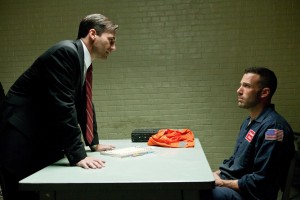 Affleck could have fallen prey to the speed cutting and visual overload of Michael Bay, with whom he made Armageddon and Pearl Harbor. Or he could have gone the Kevin Smith route (Affleck has been in 6 Smith films), pared down and simplistic camerawork, functional yet intimate. But Affleck hasn’t even split the difference; the editing in The Town is measured, the photography is grainy and involves a lot of comfortable over-the-shoulder shots and close-ups, and the sound is intentionally realistic, ambient noise and buzzing sounds are a key ingredient. Only the car chases, which have an amazing spatial sense and clarity are reminiscent of a director Affleck’s worked with, John Frankenheimer (on Reindeer Games), and that’s simply because Frankenheimer was a master of the car chase (Ronin, Grand Prix).
Affleck could have fallen prey to the speed cutting and visual overload of Michael Bay, with whom he made Armageddon and Pearl Harbor. Or he could have gone the Kevin Smith route (Affleck has been in 6 Smith films), pared down and simplistic camerawork, functional yet intimate. But Affleck hasn’t even split the difference; the editing in The Town is measured, the photography is grainy and involves a lot of comfortable over-the-shoulder shots and close-ups, and the sound is intentionally realistic, ambient noise and buzzing sounds are a key ingredient. Only the car chases, which have an amazing spatial sense and clarity are reminiscent of a director Affleck’s worked with, John Frankenheimer (on Reindeer Games), and that’s simply because Frankenheimer was a master of the car chase (Ronin, Grand Prix).
The best car chase that Affleck comes up with follows a botched bank robbery, and it’s so surprising to see such terrific execution (Bay shoots great car chases, they just end up on the cutting room floor), that my immediate and probably hyperbolic reaction was to think back to the best “driving towards the traffic” chase in William Friedkin’s To Live and Die in L.A. The Town is not quite on the level of Friedkin’s film, it’s not as compact or loaded with fascinating subtext and sexual tension. And The Town, certainly with its authentic cornball feel, it’s a combination of the “one last job” and the “falling for the wrong girl” genre (and apparently helicopter shots of Boston are on loan from the 40 other movies this footage seems to appear in), is not the overwhelming masterpiece that Affleck’s first directing job Gone Baby Gone was.
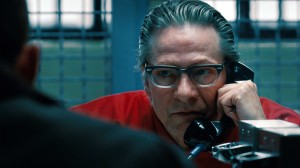 Gone Baby Gone had more in the way of twists and character development, but was also based on a more cinematic novel (by Dennis Lehane, who also wrote Shutter Island and Mystic River) with an easily delineated three act structure. The Town, based on Prince of Thieves by Chuck Hogan, carries over most of the characters (Affleck as the too smart for his friends bank robber/leader, Rebecca Hall as the love interest, Jeremy Renner as Affleck’s psycho friend with a major chip on his shoulder, Jon Hamm as the clever FBI agent after Affleck and his crew) but is smart enough to eliminate the unnecessary love triangle from the novel. Since the story already stretches credibility, Affleck falls in love with Hall (looking like a de-glamorized Kate Beckinsale) after he’s kidnapped her from the bank she works at and he was robbing, eliminating the additional sexual temptation, Hamm’s character would be the third part of a triangle, was the right move. Sure, other elements, such as Affleck’s attempt at sobriety and Pete Postlethwaite’s manipulative flower shop owner and crime boss, get short shrift. But Affleck maintains a surprising amount of humor in the dialogue (“we’ll never get 24 hour surveillance unless one of these idiots converts to Islam”) and in the story (the movie features the best “cop looking the other way” moment in film history), which helps minimize the feeling of sincere melodrama at the film’s center.
Gone Baby Gone had more in the way of twists and character development, but was also based on a more cinematic novel (by Dennis Lehane, who also wrote Shutter Island and Mystic River) with an easily delineated three act structure. The Town, based on Prince of Thieves by Chuck Hogan, carries over most of the characters (Affleck as the too smart for his friends bank robber/leader, Rebecca Hall as the love interest, Jeremy Renner as Affleck’s psycho friend with a major chip on his shoulder, Jon Hamm as the clever FBI agent after Affleck and his crew) but is smart enough to eliminate the unnecessary love triangle from the novel. Since the story already stretches credibility, Affleck falls in love with Hall (looking like a de-glamorized Kate Beckinsale) after he’s kidnapped her from the bank she works at and he was robbing, eliminating the additional sexual temptation, Hamm’s character would be the third part of a triangle, was the right move. Sure, other elements, such as Affleck’s attempt at sobriety and Pete Postlethwaite’s manipulative flower shop owner and crime boss, get short shrift. But Affleck maintains a surprising amount of humor in the dialogue (“we’ll never get 24 hour surveillance unless one of these idiots converts to Islam”) and in the story (the movie features the best “cop looking the other way” moment in film history), which helps minimize the feeling of sincere melodrama at the film’s center.
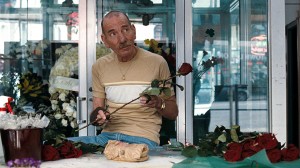 It also helps the film avoid an overdose of slickness that would otherwise dehumanize the film; Despite the abundance of intense shoot-outs, there’s a great detail where a character who is trapped on the sidewalk and cornered by the police reaches for grape soda that’s been littered on the street, simply for his last moment of pure adolescent joy (and thirst quenching). The grape soda, encased in a Styrofoam cup and cheap-looking straw, is a terrific metaphor for the film itself, because despite how successful the heist crew is, they still live like poverty-stricken working class people who find anyone trying to better themselves and get out of the neighborhood to be a traitor. This works like last spring’s Australian thriller The Square, where criminals hide out in poor areas because that’s all they know, regardless of how much money they hide away.
It also helps the film avoid an overdose of slickness that would otherwise dehumanize the film; Despite the abundance of intense shoot-outs, there’s a great detail where a character who is trapped on the sidewalk and cornered by the police reaches for grape soda that’s been littered on the street, simply for his last moment of pure adolescent joy (and thirst quenching). The grape soda, encased in a Styrofoam cup and cheap-looking straw, is a terrific metaphor for the film itself, because despite how successful the heist crew is, they still live like poverty-stricken working class people who find anyone trying to better themselves and get out of the neighborhood to be a traitor. This works like last spring’s Australian thriller The Square, where criminals hide out in poor areas because that’s all they know, regardless of how much money they hide away.
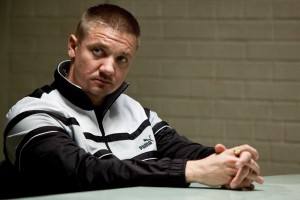 The characters in The Town are okay with being aimless and living without forethought, since they think prison is the only option (Chris Cooper gives a sneaky performance as Affleck’s incarcerated father). And Hamm’s FBI agent is fully aware of that, he understands the unfair odds of his manpower and arsenal of weapons versus whatever fell off a truck that Affleck and crew can get their hands on. There’s an amusing scene where Hamm tries to get Hall to cooperate and suggests that she can be put in witness protection in “Cleveland or Arizona, somewhere safe.” He knows how to manipulate her into getting what he wants, but he also knows she’s just a pawn in a case that he’ll have forgotten about in six months (another advantage in eliminating his emotional involvement with her). Hamm’s unstated cynicism about his targets (and what’s an acceptable place to hide out in) is one of the best things that Affleck gives us in The Town, each character has their own reasonable and completely different motivations, some emotional, some not, and we can understand and sympathize with each perspective, no matter how extreme. When was the last time you saw an action movie that successfully played it straight?
The characters in The Town are okay with being aimless and living without forethought, since they think prison is the only option (Chris Cooper gives a sneaky performance as Affleck’s incarcerated father). And Hamm’s FBI agent is fully aware of that, he understands the unfair odds of his manpower and arsenal of weapons versus whatever fell off a truck that Affleck and crew can get their hands on. There’s an amusing scene where Hamm tries to get Hall to cooperate and suggests that she can be put in witness protection in “Cleveland or Arizona, somewhere safe.” He knows how to manipulate her into getting what he wants, but he also knows she’s just a pawn in a case that he’ll have forgotten about in six months (another advantage in eliminating his emotional involvement with her). Hamm’s unstated cynicism about his targets (and what’s an acceptable place to hide out in) is one of the best things that Affleck gives us in The Town, each character has their own reasonable and completely different motivations, some emotional, some not, and we can understand and sympathize with each perspective, no matter how extreme. When was the last time you saw an action movie that successfully played it straight?



